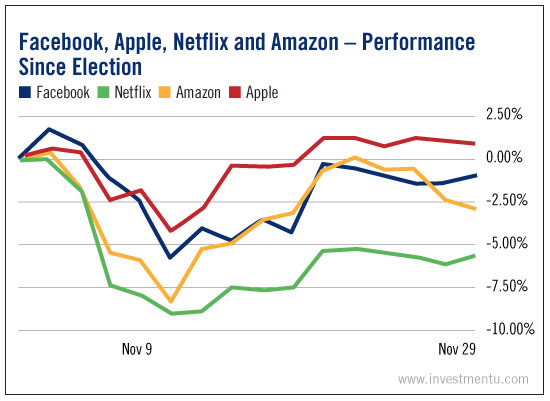Many Americans learned a hard lesson after the election: The world is much less predictable than we’d like to think. The pundits and pollsters were dead certain about their forecasts. The mainstream media reported them like gospel.
And in the end, they were all completely wrong.
With that in mind, it shouldn’t be surprising that the market has defied the expectations of “experts.” The so-called financial gurus said a Trump victory would cause an instant crash. But the S&P 500 has actually taken off in the weeks since the election. Rather than the expected mass sell-off, we saw a mass migration between sectors. Some of the biggest victims of this recalibration were tech stocks.
In spite of their sustained fundamental strength, negative speculators went bananas on stocks like Facebook (Nasdaq: NASDAQ:FB), Apple (Nasdaq: NASDAQ:AAPL), Netflix (Nasdaq: NASDAQ:NFLX) and Amazon (Nasdaq: NASDAQ:AMZN).

It might have been tempting to sell during this temporary crash... but hopefully, you weren’t among the mobs who did so. As you can see, all four of the stocks above have been edging higher after that initial dip.
Fact is there’s no logical reason to dump tech stocks just because Trump won the election. Below, we’re going through the most common speculative arguments against holding tech stocks after the election. In the process, we’ll expose the flimsy reasoning behind this kind of short-term speculation.
Trump Has Personal Feuds With Some Tech Companies
There’s no denying that President-elect Trump is willing to make some enemies to reach his goals. Two of those enemies are Apple’s Tim Cook and Amazon’s Jeff Bezos.
Throughout his campaign, Trump targeted both CEOs and their companies for several reasons. For one, both Bezos and Cook supported Clinton. According to Wikileaks, Cook was even a contender for her vice president spot. And Bezos owns The Washington Post, which has been accused of a pro-Clinton bias.
But Trump’s feuds with these tech moguls aren’t entirely personal. He has cited Apple as an example of an American company with offshore production. And he’s made some vague antitrust-related threats against Amazon.
Are these good enough reasons to panic-sell either company? We certainly don’t think so.
These are speculative concerns, not financial ones. The president-elect doesn’t have the authority to move a private company’s factories around. And even if he really wanted to sue Bezos and The Washington Post for libel, he’d need to change the libel laws with the consent of Congress and the Supreme Court. Ditto for his notions of pursuing an antitrust case against Amazon.
The Tech Sector Relies on Immigrant Workers
At a glance, the immigration issue is a slightly more sensible reason to sell tech stocks after the election. But it breaks down upon further scrutiny.
Basically, some tech investors are concerned about the effects of Trump’s anti-immigrant agenda on tech stocks because Silicon Valley is largely comprised of immigrants. It’s a reasonable point. Microsoft (Nasdaq: NASDAQ:MSFT) and Alphabet (NASDAQ:GOOGL) both have foreign-born CEOs. And you’d be hard-pressed to find a tech startup where every single coder is an American native.
But these are all legal immigrants. The president-elect has repeatedly tempered his anti-immigration rhetoric by saying that he’s not opposed to legal immigration. He hasn’t said much about H-1B work visas, which many tech professionals use to legally enter the country. “Guest worker” visa programs also have broad support among congressional Republicans.
So upon further examination, immigration reform isn’t a good reason to sell tech stocks either. It’s another illogical knee-jerk reaction to Trump’s victory. Yes, many tech professionals are immigrants. No, the president-elect isn’t going to have them deported.
This November was a wake-up call to people who follow a herd mentality. All of the major media outlets said there was no way Trump could win the presidency, yet he did. Then, a ton of investors acted like the tech sector is doomed under the Trump administration. Does that make it true?
